News
Universities grind to a halt as strike goes into 2nd month
Empty campus classrooms, campus offices closed, exams postponed, university heads concerned over the daily maintenance of laboratories and farms, electricity and water facilities disrupted – the signs of a crippled university system are everywhere with the strike by non-academic staff reaching a 30-day milestone.
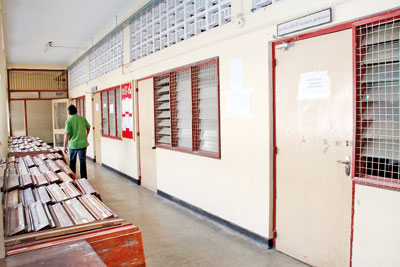
Campus offices remain closed during the strike
Several rounds of negotiations have failed and more than 15,600 non-academic staff ranging from registrars, to bursars, librarians, laboratory assistants, accounting staff, clerks and labourers, all whom are essential to run a university smoothly, are missing in action.
Warnings, meetings, discussions and assurances over the weeks failed as a determined set of non-academic staff continue to strike, insisting on an immediate response to their demands by government.
The strikers demand the immediate payment of the Monthly Compensatory Allowance (MCA), promised last year by the former minister of higher education and highways, Lakshman Kiriella, and higher education officials both from the ministry and the University Grants Commission (UGC).
University Trade Union Joint Federation Secretary Dhammika S. Priyantha said staff would not stand for any more discussions on the issue as they had been assured they would be given the allowance last August.
“During the past few weeks, we met Higher Education Minister Kabir Hashim and State Minister for Higher Education Mohan Lal Grero, both of whom assured they would look into the matter. But no-one promised to pay it right away. The previous minister promised us to provide the allowance last year – why is there this delay?” he asked.
According to Mr. Priyantha, an allowance worth 20 percent of the MCA should have been paid to non-academic staff in 2015 and had still not been paid by 2016. Last year, non-academic staff were assured they would gain the full allowance.
While payment for the MCA is their main demand, staff are also demanding an equitable insurance scheme covering all non-academics in all universities, and a satisfactory pension scheme. They also want the property loan available to staff to be doubled to Rs. 2 million.
The strikers are from 15 state universities and postgraduate institutes governed by the UGC.
Mr. Priyantha said some 150,000 internal university students as well as external degree, diploma and postgraduate students were affected by the strike.
The stoppage is having an impact on water, electricity, laboratories and plant/animal farms as well as on exam paper preparation, printing and other administration work.
“Lab assistants come under the non-academic staff category: the authorities should keep in mind that laboratories in some universities, such as in medical faculties, have live research samples that need temperatures to be monitored,” Mr. Priyantha said.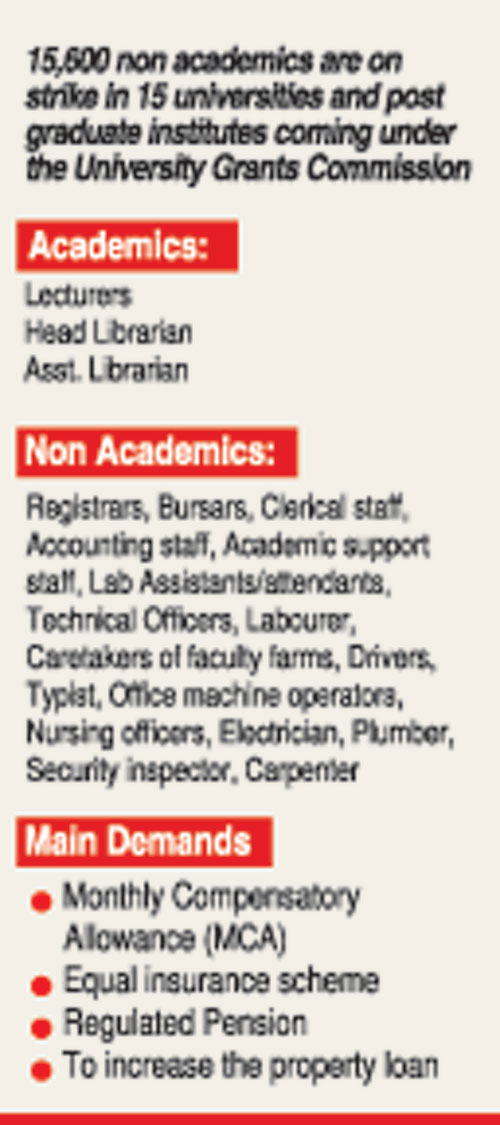
“For instance, Sri Jayawardenapura University’s medical faculty is conducting research on dengue with patient samples obtained from the Kalubowila Hospital.” In order to protect valuable research some non-academic staff were providing volunteer service, the union leader said.
“If there is no response to our demands we will also remove ourselves from volunteer work,” he warned.
Students in paid diploma courses, postgraduate courses and weekend programmes complain that exams scheduled for March have been postponed without alternative exam dates being given and that this was resulting in delayed course finalisations.
All university internal students have been sent home without exam dates being given.
University heads (Vice-Chancellors) are greatly inconvenienced by non-academic staff not reporting to work for almost a month.
Peradeniya University Vice-Chancellor Prof. Upul B. Dissanayake said academic affairs had come to a standstill and universities were struggling to maintain essential services such as electricity and water, as well as maintainance of farms and laboratories.
“We have obtained volunteers from non-academic staff with much difficulty,” he said. They are feeding the animals on the farms. But if that stops, our livestock and agriculture departments will suffer.” He emphasised that laboratory maintainance was essential to maintain live research samples.
Peradeniya University, which has about 2,000 non-academic staff, will suffer the loss of payments due to the strike.
“As non-academic staff are involved in processing salaries for staff other than academic staff, those salaries too will be affected, especially prior to the New Year,” Prof. Dissanayake pointed out.
Jaffna University Vice-Chancellor Prof. Ratnam Vigneswaram said there were about 700 non-academics at his university and that academic and administration work had been affected by the strike.
“All students have been sent home until the strike ends,” he said.
State Minister of Higher Education Mohan Lal Grero said the Treasury had been approached to release the funds for the MCA.
“Discussions are being held with the Treasury. We are trying to solve this issue as soon as possible,” he said.
Mr. Priyantha said he was disappointed that higher education authorities had not consulted the Treasury before giving last year’s assurance that the MCA would be paid to non-academic staff.
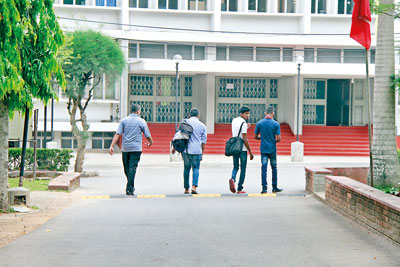
Pix by Indika Handuwala
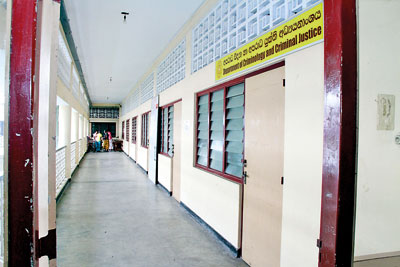
Empty Halls
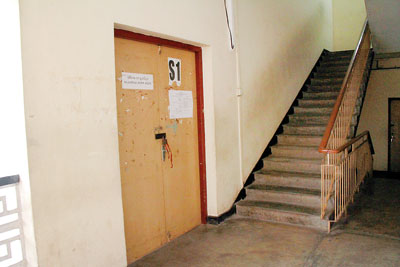
Campus classrooms locked

